The delivery of the first 38 M1A2T Abrams tanks, originally slated for around the middle of the year, might be delayed to the fourth quarter, as the US military reportedly plans to invite Taiwan to participate in joint exercises in the second half of the year, a source in the know in the military said yesterday.
The monthly production rate for the baseline M1A2 model stood at about four, so by that calculation, about 30 M1A2Ts should have been manufactured and delivered to the Taiwanese military for trial and training, the source said.
About 18 M1A2Ts are expected to be used at the exercise, and the delivery of the first batch of tanks would suffer further delays until the manufacturers produce more units, they said.

Photo: AFP
The Army Command Headquarters said that all Republic of China Army military exercises with foreign nations are pre-planned and declined to comment further on the issue.
The delivery process is on schedule and construction of a shooting range at Kengzikou (坑子口) in Hsinchu County is being adjusted accordingly, the army added.
The tank deal cost NT$40.5 billion (US$1.26 billion) and was to be delivered to Taiwan over three years. The first batch of 38 units is expected to arrive this year, 42 next year and the final 28 in 2026.
The source said that compared to in-service MBTs with 105mm tank guns, the M1A2T’s 120mm tank gun is a massive improvement.
The new tanks would primarily be deployed in northern Taiwan to strengthen defenses around the nation’s political and economic centers and shoreline defense, the source added.
As the tanks are still being manufactured, training for the tank crew and instructors, as well as the construction of barracks and training grounds, are being held concurrently, the source said.
The military is in talks with Northrop Grumman and it is increasingly likely that the military would be able to establish factories in Taiwan to produce the 120mm rounds used by the tanks, they added.

Taiwanese can file complaints with the Tourism Administration to report travel agencies if their activities caused termination of a person’s citizenship, Mainland Affairs Council Minister Chiu Chui-cheng (邱垂正) said yesterday, after a podcaster highlighted a case in which a person’s citizenship was canceled for receiving a single-use Chinese passport to enter Russia. The council is aware of incidents in which people who signed up through Chinese travel agencies for tours of Russia were told they could obtain Russian visas and fast-track border clearance, Chiu told reporters on the sidelines of an event in Taipei. However, the travel agencies actually applied

New measures aimed at making Taiwan more attractive to foreign professionals came into effect this month, the National Development Council said yesterday. Among the changes, international students at Taiwanese universities would be able to work in Taiwan without a work permit in the two years after they graduate, explainer materials provided by the council said. In addition, foreign nationals who graduated from one of the world’s top 200 universities within the past five years can also apply for a two-year open work permit. Previously, those graduates would have needed to apply for a work permit using point-based criteria or have a Taiwanese company

The Shilin District Prosecutors’ Office yesterday indicted two Taiwanese and issued a wanted notice for Pete Liu (劉作虎), founder of Shenzhen-based smartphone manufacturer OnePlus Technology Co (萬普拉斯科技), for allegedly contravening the Act Governing Relations Between the People of the Taiwan Area and the Mainland Area (臺灣地區與大陸地區人民關係條例) by poaching 70 engineers in Taiwan. Liu allegedly traveled to Taiwan at the end of 2014 and met with a Taiwanese man surnamed Lin (林) to discuss establishing a mobile software research and development (R&D) team in Taiwan, prosecutors said. Without approval from the government, Lin, following Liu’s instructions, recruited more than 70 software

Chinese spouse and influencer Guan Guan’s (關關) residency permit has been revoked for repeatedly posting pro-China videos that threaten national security, the National Immigration Agency confirmed today. Guan Guan has said many controversial statements in her videos posted to Douyin (抖音), including “the red flag will soon be painted all over Taiwan” and “Taiwan is an inseparable part of China,” and expressing hope for expedited reunification. The agency last year received multiple reports alleging that Guan Guan had advocated for armed reunification. After verifying the reports, the agency last month issued a notice requiring her to appear and explain her actions. Guan